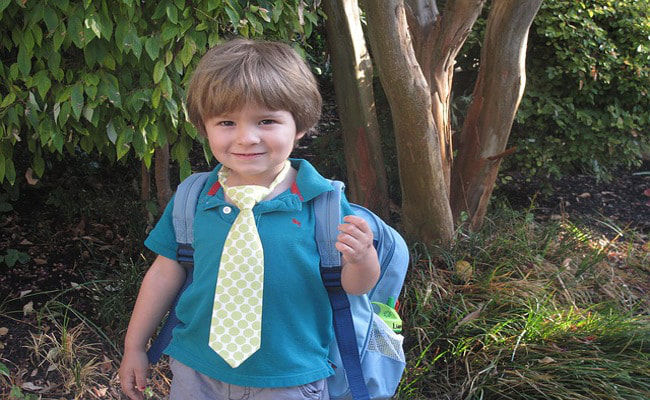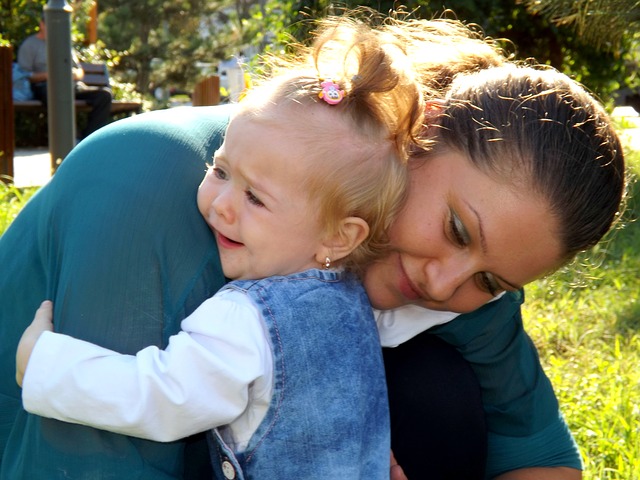In part 1 of our article New Year New School: Concerns and Fears, Yvonne Chee, a mother of two shared her experience of how cope with her boy going to school.

Here are 10 ways how you can help ease your tot’s (and your own) insecurities when going to a new school.
1. Assurance from School
Provide them with treats after school and encourage them to tell you what they did in school. Providing treats (healthy ones of course!) or bringing them to do their favourite activity after school may help them to look forward to seeing you after school. Sam will always look forward to see me after school so that we can take a short break outside his school to chase some birds (his favourite activity at 21 months old) or play at the playground. It is also important for us to encourage our children to share with us what they did in school – you may not fully understand what they are saying through their babbling, but having such a conversation allows them to know that mommy is interested in what they are doing in school and is proud of them attending school.
For Sharon, she finds that it was extremely helpful and reassuring that the school principal connected with her on a regular basis via Whatsapp – sharing with her about Sera’s growth and sends her photos of the activities in school. As the school teachers have a routine of sharing the activities that were conducted in school through Facebook, Sharon can also visit the page to find out what Sera has been busy with that day. The willingness to connect with the parents gave Sharon more confidence and less worry to place Sera alone in school.
2. Familiarizing with the Environment
I sought help from the teachers to assist in allowing us to come visit the compound daily, for a week before his school starts. I had in mind to get him familiarize with the journey to school, the school compound as well as the faces of the teachers, hoping that this will help him to feel more secure and safe when he starts school. I was very thankful that his teachers were very supportive!
So for about a week before school, Sam and I walked daily to school. We talked about school as we walked, the teachers we will see, the activities he will do and the assurance that mommy will promise to come back and pick him. We would also familiarize ourselves with the different spots of the journey to school; such as the cat at our void deck, the basketball court, the man-made tree trunk in the middle of the garden, the yellow flowers and the pigeons by the grass patch next to the school. So he knew what to expect as he walks through the journey to school! I believe that the consistency gave him a lot of assurance.
I guess helping Sam to be familiar with his school was really helpful. Sam never really did fuss whenever we had to take that walk to school. Although he did cry the moment we reached the door of the school.
3. Read a Book About School
Sharon shared that she introduced the idea of school to Sera through books. She would use the picture book to tell her about the fun she will have in school and the friends she will meet. And when she started school, she would try to be consistent with the book and tells her to “have fun in school and I will see you tonight”.
4. Using a Visual Clock

Not that Sam would understand as he was too young to know how to read time, but a friend shared that it would be helpful to use time to assure him that mommy will come back to pick him up. I wasn’t sure how effective it was until I tried it. I drew up a clock and added pictures of the school and myself, and assured him that I will come pick him up at 1030am everyday. The card was then laminated and tied to his backpack. And whenever he felt insecure, the teachers and I would whip it out to remind him of what I
It was as if Sam knew what I was communicating to him. Whenever I say, “Sam, at 8.30am (and I pointed to the clock) where will you go to?” and Sam will repeat “School”, said earlier at home.
“Mommy promise you that I will come and pick you up at 10.30am (and I will point to the clock again) okay?” and he will reply “Okay”. Somehow he would cry lesser whenever he sees this card.
5. Set Realistic Expectations
Set realistic expectations for you and your child. They will definitely need some time to adjust to a new environment; after all it’s a strange place for them. So, expect drama on the first day or week or even month in school. Work with the teachers to support and help your child adjust to school.
6. Keep Your Promise
Children will be more confident and assured when we adults keep the promise that is made to them. So, pick them up at the time that you promised them you would, try not to keep them waiting for too long. Bring along the treats, or bring them out to the playground if you promised them you would if they attend school, after school.

7. Comfort Items and Food
For a month, I will pack along his favourite character toy (Elmo teddy) to assure him Elmo will go to school with him. It was helpful when the teachers supported the idea and also used Elmo to assure him when he feels insecure in school.
I also packed in his favourite biscuits and bread, and informed the teachers that should he become unsettled, they could try to use them to bring him comfort. Sam will usually settle down whenever he is offered with his favourite biscuits.
8. Give Assurance
Our children will need lots of praises, assurances and encouragements to feel confident to be on their own in a new environment. After all, they have been with us for so long, and it is only normal for them to make any fuss when they are insecure about the new environment. Try not to reprimand them, but give lots of hugs and assurances that you will come back to pick them up.
9. Saying Goodbye
Send them off to school with a big smile regardless of how you actually feel, say goodbye and assure them that you will come back for them. Many teachers have shared with me that it is best for the parent to drop their children off at school and leave the settling to the teachers. The longer the parent chooses to stay behind, allowing the child to see him/her, the longer it will take for the child to settle and adjust to school. If you are insecure about just dropping your child off at school, work out a timeline with the teachers to stay to assure your child in class, and then leave when it’s time to let your child grow his/her own wings to fly.
It is also important say goodbye when you leave (especially when the teachers allow you to sit in his class), do not secretly disappear. Although saying goodbye is hard, but it will assure them that you will come back. Your child will feel more insecure should you choose to disappear behind his back when he is having fun in school. By doing so, may deter him from playing with his friends.
Sam’s teachers were kind enough to allow me to sit in his class for the first 30 min for 3 days. Although Sam still cried in the first 2 weeks at school after that, his teachers saw a tremendous improvement in his adjustment at the end of the first week in school. It took Sam about 2 weeks before he finally settled and felt more comfortable to play with his peers and the teachers. I believe that the decision I have made to entrust him with the teachers and not loiter around to disrupt them from settling Sam plays a big part in helping Sam to adjust more smoothly at school.

10. Positive Reinforcements
Provide them with treats after school and encourage them to tell you what they did in school. Providing treats (healthy ones of course!) or bringing them to do their favourite activity after school may help them to look forward to seeing you after school. Sam will always look forward to see me after school so that we can take a short break outside his school to chase some birds (his favourite activity at 21 months old) or play at the playground.
It is also important for us to encourage our children to share with us what they did in school. You may not fully understand what they are saying through their babbling, but having such a conversation allows them to know that mommy is interested in what they are doing in school and is proud of them attending school.
By Yvonne Chee.
* * * * *
Like what you see here? Get parenting tips and stories straight to your inbox! Join our mailing list here.
Want to be heard 👂 and seen 👀 by over 100,000 parents in Singapore? We can help! Leave your contact here and we’ll be in touch.


























































Leave a Comment: